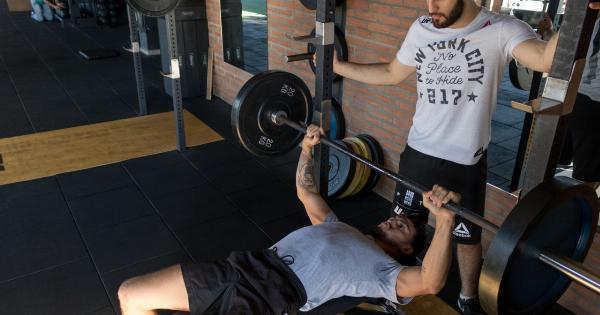Nutrition plays a crucial role in optimizing athletic performance. Whether you are a professional athlete or a casual fitness enthusiast, fueling your body properly can enhance your endurance, strength, and overall performance.
In this article, we will explore the various ways to optimize your athletic performance through nutrition.
The Importance of Macronutrients
Macronutrients, which include carbohydrates, proteins, and fats, are the cornerstone of any athlete’s diet. These nutrients provide the energy required to perform at your best. Let’s take a closer look at each macronutrient:.
1. Carbohydrates
Carbohydrates are the primary source of energy for athletes. They are broken down into glucose, which is absorbed into the bloodstream and used by the muscles as fuel.
Complex carbohydrates, such as whole grains, fruits, and vegetables, provide sustained energy, while simple carbohydrates, such as sugars, offer a quick burst of energy. It is essential to consume an adequate amount of carbohydrates to optimize athletic performance.
2. Proteins
Proteins are crucial for muscle repair and growth. Athletes require more protein than sedentary individuals to support their training.
Good sources of protein include lean meats, fish, eggs, dairy products, legumes, and plant-based sources like tofu and quinoa. Consuming protein within 30 minutes after exercise can help kickstart the muscle recovery process.
3. Fats
Fats are a concentrated source of energy and play a vital role in hormone production, joint health, and insulation. It is important to choose healthy fats, such as avocados, nuts, seeds, and olive oil, while limiting saturated and trans fats.
Including a moderate amount of healthy fats in your diet can improve performance and aid in overall well-being.
The Role of Micronutrients
In addition to macronutrients, athletes must also pay attention to their intake of micronutrients.
Micronutrients, including vitamins and minerals, are essential for various bodily functions, including energy production, muscle contraction, and immune health. Here are some important micronutrients and their roles:.
1. Vitamin D
Vitamin D helps with bone health and muscle function. Spending time outdoors or consuming fortified foods like dairy products, fatty fish, and fortified cereals can help optimize vitamin D levels.
2. Iron
Iron is crucial for oxygen transport, and athletes are at a higher risk of iron deficiency. Good sources of iron include lean meats, fortified cereals, spinach, and legumes.
Pairing iron-rich foods with vitamin C-rich foods, like citrus fruits, can enhance absorption.
3. B Vitamins
B vitamins, including B12, B6, and folate, are involved in energy production and red blood cell formation. Animal products, whole grains, leafy greens, and legumes are excellent sources of B vitamins.
Hydration for Performance
Hydration is another crucial aspect of optimizing athletic performance. Dehydration can lead to decreased endurance, muscle cramps, and impaired cognitive function.
It is recommended to drink water regularly throughout the day and increase fluid intake during exercise. Sports drinks can be useful for prolonged intense workouts to replenish electrolytes lost through sweat.
Pre and Post-Workout Nutrition
Timing your nutrition around workouts is essential for maximizing performance and recovery. Here are some guidelines for pre and post-workout nutrition:.
1. Pre-Workout
Consuming a balanced meal or snack containing carbohydrates, proteins, and healthy fats 1-3 hours before exercise can provide sustained energy. Choose easily digestible foods to avoid discomfort during the workout.
Some examples include a banana and nut butter, a protein smoothie, or whole-grain toast with avocado.
2. Post-Workout
After exercise, it is crucial to replenish glycogen stores and aid in muscle repair. Consuming a combination of carbohydrates and protein within 30 minutes of exercise is ideal.
This can be achieved through a protein shake, Greek yogurt with fruits, or a lean meat wrap with whole-grain bread.
Supplements for Performance Optimization
While a well-rounded diet should provide most of the necessary nutrients for optimal performance, certain supplements may be beneficial for athletes.
However, it is important to consult with a healthcare professional or registered dietitian before adding any supplements to your regimen. Some commonly used supplements include:.
1. Creatine
Creatine has been shown to improve strength and power during short-duration, high-intensity activities. It can be particularly beneficial for athletes involved in sprinting, weightlifting, and similar activities.
2. Omega-3 Fatty Acids
Omega-3 fatty acids offer anti-inflammatory properties and may aid in reducing exercise-induced muscle damage. They can be obtained from fatty fish, such as salmon or through fish oil supplements.
3. Branched-Chain Amino Acids (BCAAs)
BCAAs are popular among athletes for their potential to reduce muscle breakdown and enhance muscle recovery. They can be consumed in supplement form or found naturally in foods like eggs, dairy, and lean meats.
Rest and Recovery
Optimizing athletic performance is not just about nutrition and training; adequate rest and recovery are equally important. Sleep is essential for muscle repair, hormone regulation, and overall well-being.
It is recommended to aim for 7-9 hours of quality sleep each night. Additionally, incorporating rest days and active recovery sessions into your training routine allows your body to heal and prevent overtraining.
Conclusion
In conclusion, proper nutrition plays a vital role in optimizing athletic performance. Adequate intake of macronutrients and micronutrients, along with proper hydration, can significantly enhance endurance, strength, and overall well-being.
Timing your nutrition around workouts and considering supplements under professional guidance can further enhance your performance. Remember, rest and recovery are equally important in achieving your fitness goals. By fueling your body with the right nutrients and giving it enough time to rest, you can elevate your athletic performance to new heights.





























